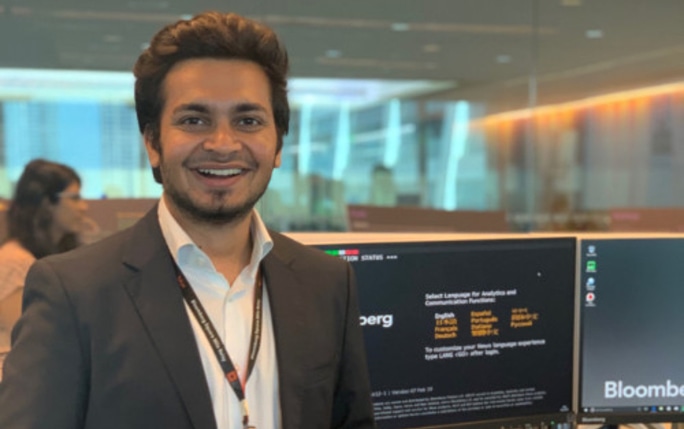Nirav Tanna (BA Accounting and Finance 2017) shares his involvement with diversity and inclusion activities at Bloomberg

We caught up with graduate, Nirav Tanna, now working as a Global Entities Data Specialist at Bloomberg LP in Mumbai. Many ULMS graduates take part in working groups outside of their main roles, getting involved with everything from corporate social responsibility to mental health initiatives. We wanted to learn more about Nirav’s involvement with Bloomberg’s diversity and inclusion (D&I) activities.
Before we get on to D&I, let’s talk about your role as Global Entities Data Specialist – what does this involve?
My primary objective is ensuring that the entities data for all financial securities on the Bloomberg Terminal is readily available to our clients in a timely and accurate manner. This involves working with stakeholders across and outside of Bloomberg to source, clean, and publish data. We also use this data to help different stakeholders, assisting on sales, publishing news, working with clients and much more, all whilst working towards being a Subject Matter Expert in our products. Before the Entities role, I specialised in Fixed Income and Equity Corporate Actions. If I had to sum up this role in one line: ‘No day is the same!’.
What’s been your personal highlight since getting involved with D&I at Bloomberg?
I see myself as an active ally for all of Bloomberg’s Diversity & Inclusion (D&I) initiatives. Over the last few years, I have participated in or contributed to many D&I initiatives, such as our Unconscious Bias training, Mental Health Awareness campaigns, the Bloomberg Women’s Buy-Side Network, and leading an APAC-wide D&I Transparency working group within my department. However, my personal highlight was when I was chosen to be the Data Head for Bloomberg’s first ever Equality Summit in Asia. This two-day event had prominent D&I activists, CEOs, Ministers and other well-known names in the finance world come in to talk about D&I. I was tasked with working with the speakers and panelists to prepare relevant data and charts that could be presented to support the discussions while the event was being broadcast globally. It was extremely rewarding to see my ideas put into action in support of the points being discussed by such a distinguished set of speakers on such a large stage.
What attracted you to take part in Bloomberg’s D&I activities?
I have always wanted to contribute to causes outside of my core work. This habit stems from my time at University of Liverpool when I led the Enactus Society. I did not want to let that side of my life go. When I came to Bloomberg, I was extremely fortunate to learn they have opportunities for someone like me in a data-centric role to participate in D&I initiatives. What I’ve learned after spending a few years contributing to Bloomberg’s D&I efforts is that, just like at university, the company highly values the time I put in to help create an inclusive workplace environment.
In today’s challenging environment, ensuring a level playing field for people of all backgrounds is more important than ever. Most employers have focused significant resources towards this, especially Bloomberg. I have also found that participating in D&I groups you get opportunities to lead and work across truly global teams. You also get to build your network and meet people you would never have met otherwise. These reasons, along with the real impact that my work has, are why I am still involved in Bloomberg’s D&I efforts.
What do you think organisations can do to improve (D&I)?
One thing that has worked really well for Bloomberg is the fact that we have a large number of employees involved as volunteers at all levels to introduce and lead D&I initiatives across various regions. Involving people locally on the ground helps make your initiatives more impactful and allows for the navigation of sensitive local nuances. Today, as an analyst, I can introduce an idea that aligns to our enterprise wide D&I goals and be supported and empowered to scale it up across multiple regions.